Find a Provider
From well-child visits to specialized treatment of complex illnesses and injuries, we offer comprehensive care from an exceptional team of doctors, nurses and allied professionals.
- Parents Home
- Para Padres
- A to Z Dictionary
- Allergy Center
- Asthma
- Cancer
- Diabetes
- Diseases & Conditions
- Doctors & Hospitals
- Emotions & Behavior
- First Aid & Safety
- Flu (Influenza)
- Food Allergies
- General Health
- Growth & Development
- Heart Health & Conditions
- Homework Help Center
- Infections
- Newborn Care
- Nutrition & Fitness
- Play & Learn
- Pregnancy Center
- Preventing Premature Birth
- Q&A
- School & Family Life
- Sports Medicine
- Teens Home
- Para Adolescentes
- Asthma
- Be Your Best Self
- Body & Skin Care
- Cancer
- Diabetes
- Diseases & Conditions
- Drugs & Alcohol
- Flu (Influenza)
- Homework Help
- Infections
- Managing Your Weight
- Medical Care 101
- Mental Health
- Nutrition & Fitness
- Q&A
- Safety & First Aid
- School, Jobs, & Friends
- Sexual Health
- Sports Medicine
- Stress & Coping
Assistive Devices: Positioning Aids (Slideshow)
Kids with special needs might need help with sitting Positioning aids provide supported sitting and help kids carry out everyday activities.
Watch this slideshow to see what positioning aids are available. Click on the arrows to go to the next slide or to return to an earlier slide.
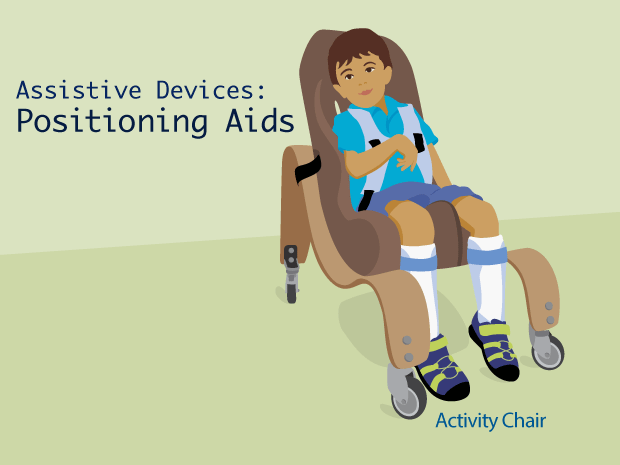
Positioning aids provide extra support for kids with special needs who need help with everyday activities.
Most insurance companies provide coverage for equipment that is considered medically necessary.
Before deciding on a device, talk to a member of your care team. He or she can suggest options for your child.
Click through this slideshow to see what positioning aids are available.
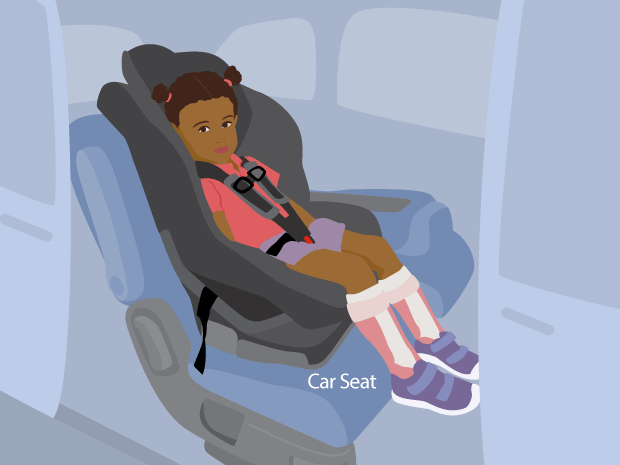
Car Seat
What Is It?
A supportive and protective safety seat for children while riding in a vehicle.
Who Needs It?
Every infant or younger child living in the United States is required by law to sit in a car seat and be buckled in during travel.
Is It Right for My Child?
Kids with special needs can often use a standard car seat, depending on their size. Older kids or those who need a lot of support may need a specialized car seat. Your child's therapist can help you find the best seat for your child.
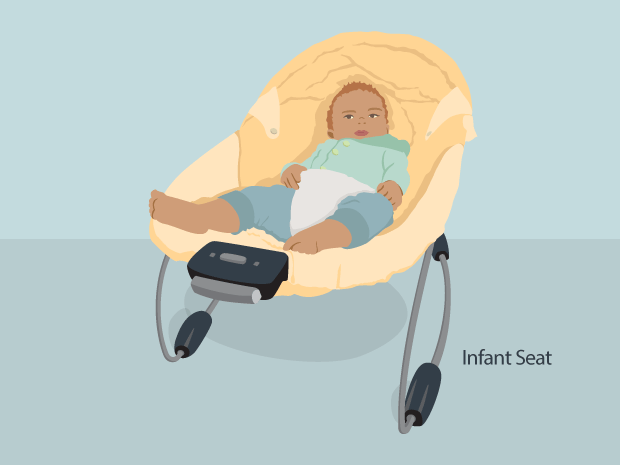
Infant Seat
What Is It?
A supportive seat that safely keeps a baby in a reclined position. These seats are useful for quiet playtime and allow for close parent?child interactions.
Who Can Use It?
Older babies who need support and are not sitting up on their own.
Is It Right for My Child?
Kids with special needs can usually use a standard infant seat but may need a rolled blanket or other support to cushion the head, neck, or other area. When choosing an infant seat, follow the product's guidelines for height and weight.
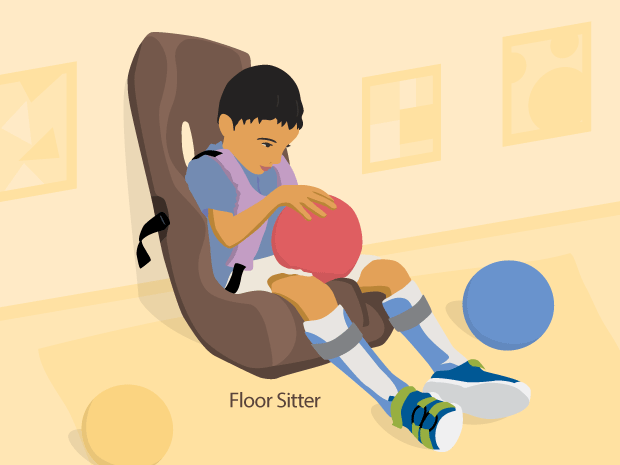
Floor Sitter
What Is It?
A supportive chair that is low to the ground or sits directly on the floor.
Who Needs It?
Kids who can't sit independently or who need added support while sitting. Floor sitters help kids maintain proper posture while playing or doing other activities. Kids can play with peers at eye level, which helps nurture those relationships.
Is It Right for My Child?
A floor sitter offers another seating option for children at home or at school. By supporting the body, a floor sitter can free a child's hands for play.
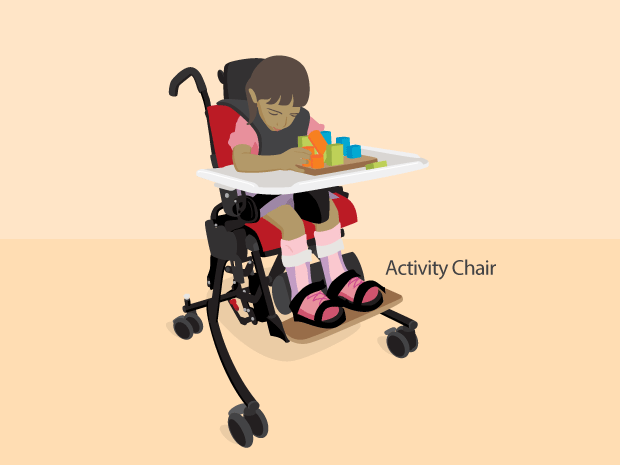
Activity Chair
What Is It?
A supportive seat that helps kids maintain proper position of the head, neck, shoulders, trunk, and legs. Some activity chairs come with a tabletop tray.
Who Needs It?
Kids who can't sit unassisted in a regular chair or who need extra support to sit upright. An activity chair lets kids do things like eat, read, or play games at table height.
Is It Right for My Child?
Most kids who use wheelchairs or who need extra support while sitting would benefit from an activity chair. It provides an alternative to being in a wheelchair while inside the home.
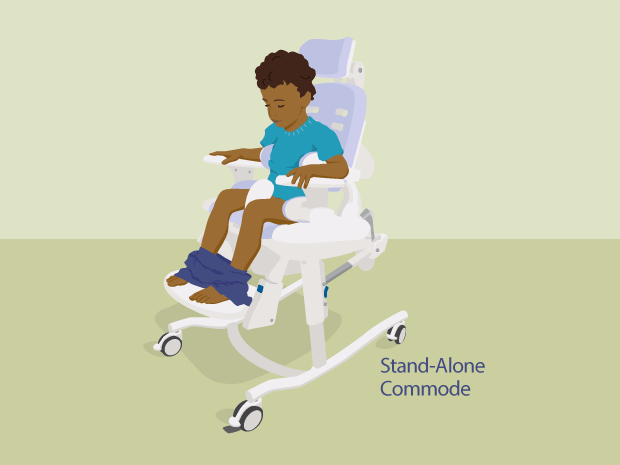
Stand-Alone Commode
What Is It?
A supportive seat with a basin for toileting. Many commodes are portable.
Who Needs Them?
Children who have trouble sitting independently on the toilet.
Is It Right for My Child?
Kids who need extra body support while using the toilet or who have difficulty with standard bathroom equipment may find toileting more successful with a commode.
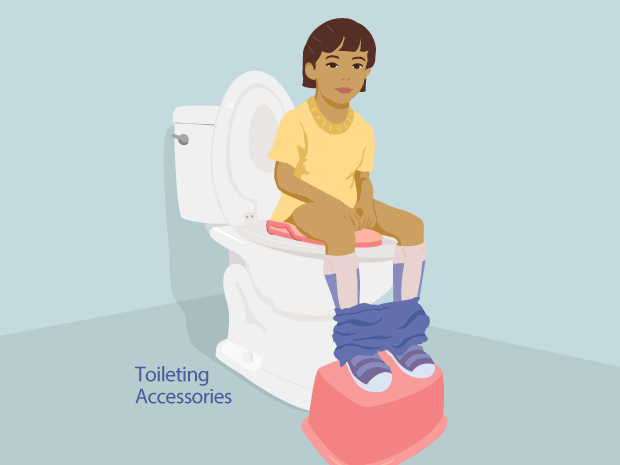
Toileting Accessories
What Are They?
This equipment helps make sitting on and learning to use the toilet safer and easier. Accessories include foot stools, arm supports, and reducer "rings" that fit over standard toilet seats for smaller kids.
Who Needs Them?
Children who have trouble sitting independently on the toilet or who are transitioning out of diapers and learning to use the toilet.
Is It Right for My Child?
Kids who need extra body support while using the toilet or who have difficulty with standard bathroom equipment may be more successful with these devices.
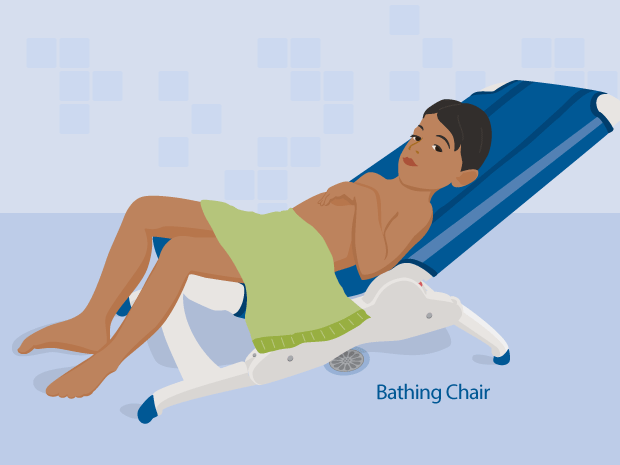
Bathing Chair
What Is It?
A waterproof chair for use in the tub or shower.
Who Needs It?
Kids who can't sit or stand safely while in the tub or shower. Some models support a child in a seated position and may also extend to a reclining position to let caregivers easily assist in bathing. Older kids who can shower independently may need a chair for safe bathing.
Is It Right for My Child?
Bathing chairs help prevent slips and falls by keeping kids safe and secure while in the tub or shower. Many models are designed to reduce the need to lift a child in and out of the bathing area.
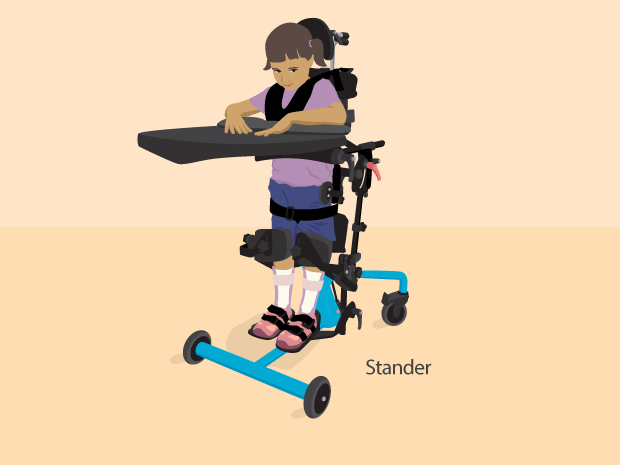
Stander
What Is It?
A supportive piece of equipment that helps children reach a standing position.
Who Needs It?
Kids who have trouble bearing weight on their legs and/or need support to be in a standing position. Standers help strengthen bones and muscles, and improve a child's head and trunk (torso) control. They also let kids interact with peers at eye level, which helps nurture those relationships.
Is It Right for My Child?
Children who can control their heads and bear some weight on their legs may benefit from a standing device.
- Caring for Your Teen With Cerebral Palsy (CP): Age 13 and Up
- Cerebral Palsy (CP) (Topic Center)
- Finding Respite Care
- Spinal Muscular Atrophy (SMA)
- Spina Bifida
- Caring for Your Child With Cerebral Palsy (CP): Age 6–12
- Caring for Your Child With Cerebral Palsy (CP): Birth to Age 5
- Physical Therapy
- Assistive Devices: Walking and Mobility (Slideshow)
- Muscular Dystrophy
- Occupational Therapy

© 1995- The Nemours Foundation. KidsHealth® is a registered trademark of The Nemours Foundation. All rights reserved.
Images sourced by The Nemours Foundation and Getty Images.


